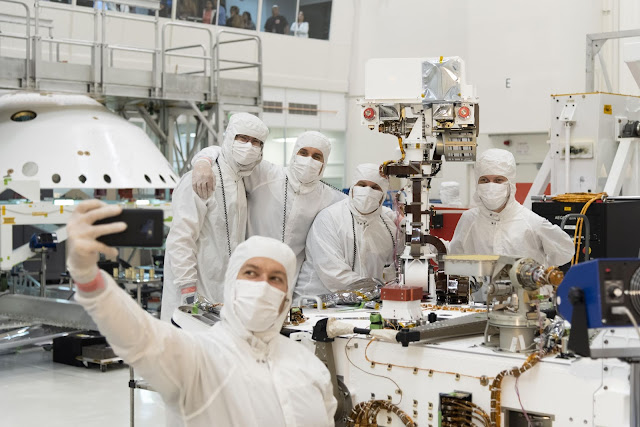PHOTO CREDIT: Flash Forward podcast - https://www.flashforwardpod.com/
POD PEOPLE: On Wednesday, I realized we were going to be in the car for at least three hours running errands, and I wanted to try to utilize that time in an educational way.
I asked the kids to find a fun, science-y podcast of some sort that we could listen to while whiling away in traffic.
Annabelle did a quick web search and reported that something called "Flash Forward" received good reviews. I'll have her tell you a bit more about it. ...
Flash Forward is a sci-fi/educational podcast run by Rose Eveleth that explores hypothetical futures, as a sort of "what-if?" scenario. The episode my family listened to recently was "Ghostbot", part of the newest miniseason about bodies. "Ghostbot" proposes a future where when you die, your personality and knowledge can be condensed onto a robotic avatar of yourself, which can continue to comfort and interact with the living.
The episode goes on to interview James Vlahos and Muhammad Aurangzab Ahmad, who have both programmed their very own "Dadbots" for this express purpose. The episode, while it has rather poor sound quality at times, is overall very well produced. If you don't mind the rather long and somewhat confusing skit at the beginning, it even dives deep into the ethical and legal aspects of these "Ghostbots".
The podcast can be found at https://www.flashforwardpod.com, where all of the main episodes are hosted for free. However, Flash Forward also has a Patreon page that gives supporters access to bonus content and perks at https://www.patreon.com/flashforwardpod for a monetary fee. If you're interested in well-researched science fiction scenarios, or you just want something to listen to on your commute, Flash Forward is both entertaining and educational.
And here's CJ's take on what we listened to. ...
On Wednesday, while travelling up to Mukilteo to visit my grandparents, we listened to a podcast titled Flash Forward. According to Flash Foward's website, "Flash Forward is a podcast about the future. Each episode we take on a possible (or not so possible) future scenario — everything from the existence of artificial wombs, to what would happen if space pirates dragged a second moon to Earth." For the episode we listened to, the scenario in question was the possibility of creating "bots" (in the form of an elaborate program that interacts with users via text) representing people who are deceased (usually loved ones such as parents).
The episode followed two men — Mohamed and James, both of whom are working on elaborate programs that talk to users using pre-generated text patterns, thus simulating conversations with the deceased person. Much of the bots' speech patterns were taken from conversations with the humans that they simulate, so that the bots' speech is similar to the actual persons' speech.
An issue that came up in the episode was the trouble (and potential consequences) of having the bots not just talk, but listen, and for their speech to change (for better or for worse) accordingly. A notorious example of a bot's speech being altered by those interacting with it was Microsoft's short-lived Tay Twitter bot, that quickly began to spout neo-Nazi propaganda after being manipulated by trolls. Another issue raised was the possibility of companies in the future offering "subscription services" of "ghostbots" to the public, making people pay on a regular basis to see simulations of deceased loved ones.It was an interesting listen. I'm glad we checked it out, and predict there are many podcasts in our future!
WORK IN PROGRESS: A newly-installed clean room webcam at NASA's Jet Propulsion Laboratory in Pasadena, California, everyone with Internet access a great view as technicians and engineers assemble NASA's Mars 2020 rover. The pioneering mission includes a robotic explorer that will be accompanied by a helicopter equipped with a high-resolution camera. (A helicopter on Mars will be a first for humanity!).
The webcam stream is live 24 hours a day (with the exception of maintenance periods or technical difficulties). The Internet address for the webcam is: https://www.youtube.com/watch?v=PaNiYPglK58
JPL will have live, moderated chats on their YouTube channel Monday through Thursday at 11 a.m. and 4 p.m. PT.
The Mars 2020 mission reached a milestone recently, with the rover's mast being raised on June 5, 2019. While Mars 2020 travels to Mars, the 7-plus foot mast will be in stowed flat on the rover's deck. Soon after touchdown, the mast will be raised. Once in place, it will provide a perch for the the rover's SuperCam, Mastcam-Z and Mars Environmental Dynamics Analyzer instruments, as well as for four Navcam engineering cameras.
Recently, a few JPL workers posed for a selfie with the Mars 2020 mast after it was attached.
Mars 2020 is set to launch from Cape Canaveral Air Force Station in Florida in July of next year. It will land at Jezero Crater on Feb. 18, 2021.
For more about the mission, visit https://mars.nasa.gov/mars2020



No comments:
Post a Comment